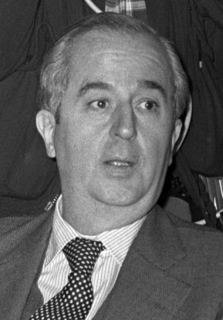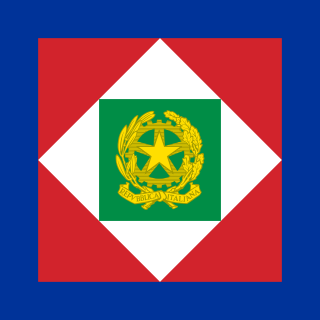Related Research Articles
Politics in Estonia takes place in a framework of a parliamentary representative democratic republic, whereby the Prime Minister of Estonia is the head of government, and of a multi-party system. Legislative power is vested in the Estonian parliament. Executive power is exercised by the government, which is led by the prime minister. The judiciary is independent of the executive and the legislature. Estonia is a member of United Nations, the European Union, and NATO.

President is a common title for the head of state in most republics. The president of a nation is, generally speaking, the head of the government and the fundamental leader of the country or the ceremonial head of state.
Separation of powers refers to the division of a state's government into branches, each with separate, independent powers and responsibilities, so that the powers of one branch are not in conflict with those of the other branches. The typical division is into three branches: a legislature, an executive, and a judiciary, which is sometimes called the trias politica model. It can be contrasted with the fusion of powers in parliamentary and semi-presidential systems where there can be overlap in membership and functions between different branches, especially the executive and legislative.

Politics of Ghana takes place in a framework of a presidential representative democratic republic, whereby the President of Ghana is both head of state and head of government, and of a two party system. The seat of government is at Golden Jubilee House. Executive power is exercised by the government. Legislative power is vested in both the government and Parliament. The judiciary is independent of the executive and the legislature.

The President of Sri Lanka is the head of state, chief executive, and de jure head of government of the Democratic Socialist Republic of Sri Lanka. The president is the chief executive of the union government and the commander-in-chief of the Sri Lanka Armed Forces.

Édouard Balladur is a French politician who served as Prime Minister of France under François Mitterrand from 29 March 1993 to 17 May 1995. He unsuccessfully ran for president in the 1995 French presidential election, coming in third place.

The Constitution of the Italian Republic was enacted by the Constituent Assembly on 22 December 1947, with 453 votes in favour and 62 against. The text, which has since been amended sixteen times, was promulgated in an extraordinary edition of Gazzetta Ufficiale on 27 December 1947. The Constituent Assembly was elected by universal suffrage on 2 June 1946, on the same day as the referendum on the abolition of the monarchy was held. The election was held in all Italian provinces. The Constitution was drafted in 1946 and came into force on 1 January 1948, one century after the Constitution of the Kingdom of Italy, the Statuto Albertino, had been enacted.

The Italian Republic was a short-lived (1802–1805) republic located in Northern Italy. Napoleon Bonaparte served as president and its capital was Milan.

The president of Italy, officially denoted as president of the Italian Republic is the head of state of Italy. In that role, the president represents national unity, and guarantees that Italian politics comply with the Constitution. The president is the commander-in-chief of the Italian Armed Forces and chairs the High Council of the Judiciary. A president's term of office lasts for seven years. The incumbent president is former constitutional judge Sergio Mattarella, who was elected on 31 January 2015, and re-elected on 29 January 2022.

The General Council of the Judiciary is the national council of the judiciary of Spain. It is the constitutional body that governs all the Judiciary of Spain, such as courts, and judges, as it is established by the Spanish Constitution of 1978, article 122 and developed by the Organic Law 6/1985 of the Judicial Power (LOPJ). The President of the CGJP is also the president of the Supreme Court.

Leoluca Orlando, is an Italian politician, long-time Mayor of Palermo and President of Italian Federation of American Football (FIDAF). He is best known for his strong opposition to the Sicilian Mafia during his mayoralty in the 1980s, which was publicly referenced in the media as the "Palermo Spring".

The Ministry of Defence is the government body of the Italian Republic responsible for military and civil defence matters and managing the Italian Armed Forces. It is led by the Italian Minister of Defence, a position occupied by Lorenzo Guerini since September 2019.

The Government of the Republic of Kenya (GoK) is the national government of the republic of Kenya which is composed of 47 Counties, each county with its own semi-autonomous governments. The national government is composed of three arms: The Legislature, the Executive and the Judiciary. Each arm is independent of the other and their individual roles are set by the Constitution of Kenya. The full name of the country is the "Republic of Kenya". Its official Swahili name is 'Jamhuri ya Kenya'. Other terms such as GoK, GK and Serikali are popularly used to refer to the Kenyan government.

The judiciary of Italy is a system of courts that interpret and apply the law in the Italian Republic. In Italy, judges are public officials and, since they exercise one of the sovereign powers of the State, only Italian citizens are eligible for judgeship. In order to become a judge, applicants must obtain a degree of higher education as well as pass written and oral examinations. However, most training and experience is gained through the judicial organization itself. The potential candidates then work their way up from the bottom through promotions.

The politics of France take place with the framework of a semi-presidential system determined by the French Constitution of the French Fifth Republic. The nation declares itself to be an "indivisible, secular, democratic, and social Republic". The constitution provides for a separation of powers and proclaims France's "attachment to the Rights of Man and the principles of National Sovereignty as defined by the Declaration of 1789."

The Ministry of Economy and Finance, also known by the acronym MEF, is a ministry of the Italian government. Its responsibilities include overseeing economic policy, public investments and spending. The Ministry's headquarters are located in Rome's historic Palazzo delle Finanze. The current minister in the Draghi Cabinet is Daniele Franco.

The Tunisian Constitution of 2014 was adopted on 26 January 2014 by the Constituent Assembly elected on 23 October 2011 in the wake of Tunisia's Jasmine Revolution that overthrew President Zine El Abidine Ben Ali. It was passed on 10 February 2014, replacing the constitutional law of 16 December 2011 that temporarily formed the basis of government after the suspension of the Constitution of 1959.

The High Council of the Judiciary is an Italian institution of constitutional importance, which regulates the Ordinary Judiciary of Italy. The High Council is based in the Palazzo dei Marescialli, in Piazza Indipendenza 6.

The Council of the Military Judiciary, also known as CMM is the self governing body of the Italian military judiciary. The seat of the council is located in Palazzo Cesi, Rome.
The 2022 Sicilian regional election for the renewal of the Sicilian Regional Assembly and the election of the President of Sicily will be held by the end of 2022.
References
- ↑ fabio (2021-01-05). "Covid, in Sicilia protocollo per la gestione delle udienze tributarie Agenzia di stampa Italpress". Italpress (in Italian). Retrieved 2021-01-08.
- ↑ "Giudici tributari: aggiornati i criteri di valutazione della professionalità". ipsoa.
{{cite web}}: CS1 maint: url-status (link) - ↑ redazione. "D'Alia eletto al Consiglio di presidenza della Giustizia tributaria". il Mattino di Sicilia - Giornale della Sicilia (in Italian). Retrieved 2021-01-08.